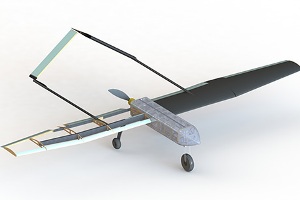Forget about the remote-controlled airplanes of your childhood – Cornell students are taking the concept of unmanned aircraft to a whole new level.
 Helios is CUAir's latest unmanned aircraft. Image credit: Beckman Coulter
Helios is CUAir's latest unmanned aircraft. Image credit: Beckman Coulter
Cornell Unmanned Air Systems (CUAIR) is an undergraduate project team that designs, builds and programs completely autonomous planes. Their aircraft are capable of taking off, following a flight plan, using a camera and locating a target, all without the assistance of a pilot.
On June 18, CUAIR will defend its world championship title at the Student Unmanned Air Systems Competition in Maryland. The competition, sponsored by the Association for Unmanned Vehicle Systems International, judges 50 international collegiate teams on their aircrafts’ ability to follow a flight plan, use GPS tracking, and take visible and infrared pictures. Teams are also judged on their ability to respond from the ground to any complications that may arise during the flight.
In addition to the physical aircraft, the teams must submit a paper that explains the methods and reasoning they used to design their plane. CUAIR came in first overall at last year’s competition and will compete this year with their new plane, Helios.
CUAIR, which comprises about 40 students, mostly engineering majors, is divided into five teams – airframe, autopilot, electrical, software and business. The autopilot team uses the Piccolo autopilot system as a basis for the plane’s software. They create a virtual model of the plane, including its center of gravity and moving parts, and run simulated flights within the software.
“It’s really cool to be involved with learning applicable skills so early on in my college career,” said team member Yasmeen Mushtaq ’17. CUAIR, one of the larger undergraduate project teams on campus, is made up of students who are “obsessed with planes,” according to Mushtaq. “Most of the team members have their pilot licenses, and there are team-sponsored field trips to Boeing.”
Once the simulations are running correctly, the data is downloaded to the physical plane, built by the airframe team, and the team runs test flights. The aircraft communicates with the ground team via a wireless network, using sensors in all of its surfaces to maintain its flight plan and communicate with the ground system. The team monitors the information coming from the plane and responds to inconsistencies in the flight plan.
The business team is responsible for fundraising, sponsorships and marketing efforts.
Kara Beckman ’17 is a writer intern for the Cornell Chronicle.